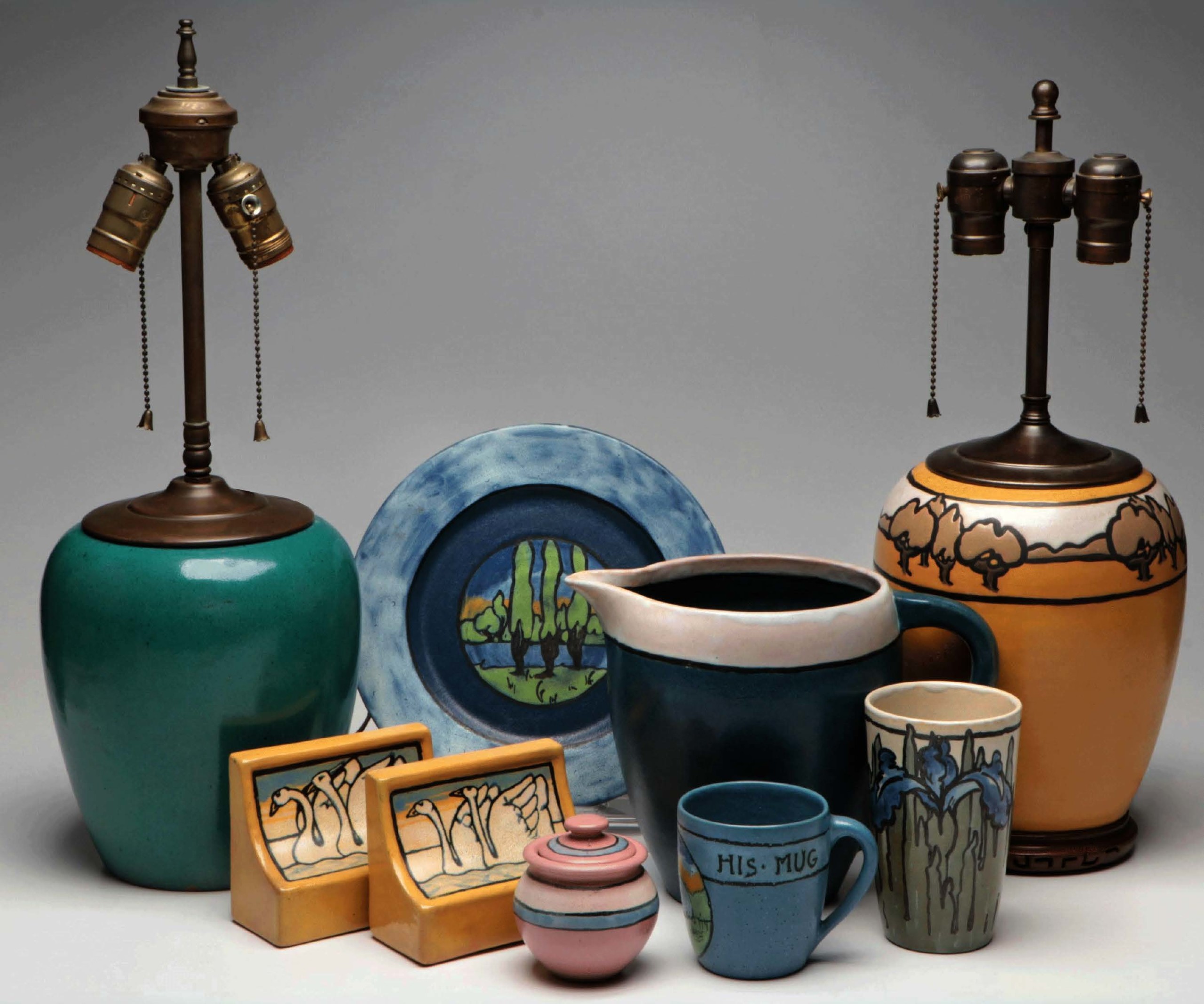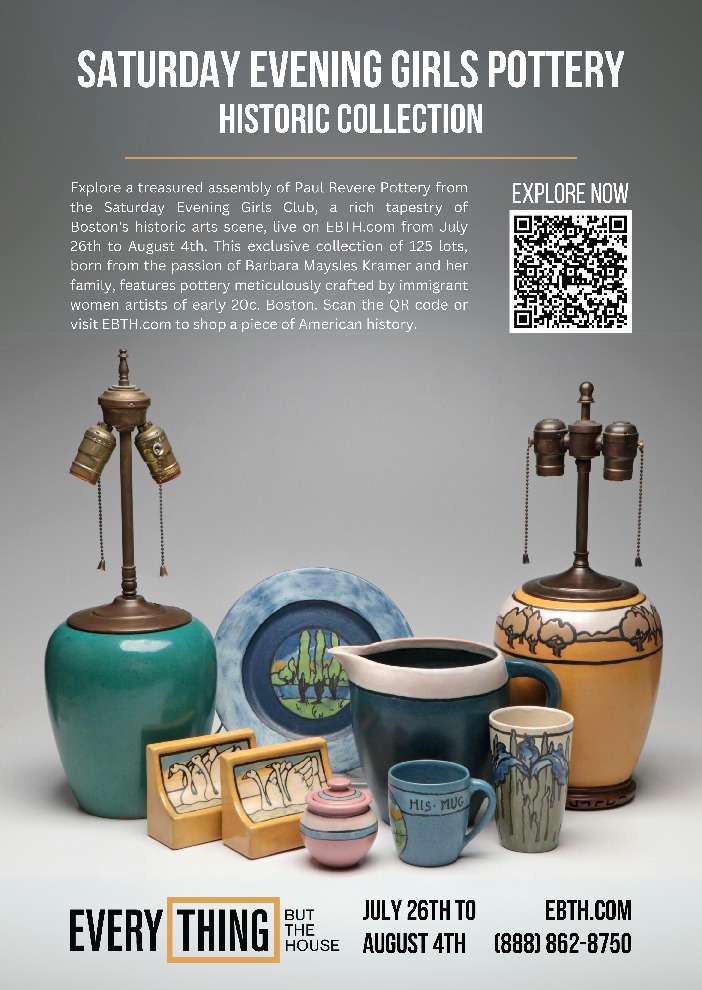Events
Home / Events

Everything But The House – Saturday Evening Girls Pottery Historic Collection
Fri Jul 26, 2024 - Sun Aug 04, 2024
-
Everything But The House – Saturday Evening Girls Pottery Historic Collection
July 26th to August 4th
EBTH.com 888-862-8750
CINCINNATI, OHIO — Everything But The House (EBTH) will offer an extensive collection of Paul Revere Pottery from the Saturday Evening Girls Club from July 26 to August 4, The collection has been the life-long passion of Barbara Maysles Kramer and her husband Bernard Kramer. Their interest in this unique pottery began with initial pieces bequeathed by Barbara’s mother, Ethel Epstein Maysles, a long-standing member of the Saturday Evening Girls Club and one of the original Paul Revere potters.
The Saturday Evening Girls Club (1899-1969) was created by Boston philanthropist Helen Storrow with the mission to provide intellectual and “proper” social stimulation for the young immigrant women in the North End, historically a rough section of Boston that was rife with illicit or unsavory temptations such as saloons and dance halls for the young ladies. The women’s club originated in a charity community building run by librarian Edith Guerrier and her partner, artist Edith Brown. The weekly meetings were conducted on Saturday evening with lectures on music, literature, art and economics. The club soon expanded to include organized parties, plays, folk-dancing recitals and concerts. Storrow’s dedication to the girls also led to building a summer camp in West Gloucester in 1906, which introduced the young ladies to nature and a rural style of living, a far cry from their life experiences in the North End.
In 1908, Guerrier and Brown, with financial help from Storrow, started a small pottery in the cellar of their home to provide the girls with a viable trade and therefore a livable wage. Soon after, it was moved to the Library Club House at 18 Hull Street and named Paul Revere Pottery due to the nearby Old North Church landmark where friends of Paul Revere had hung the lanterns surreptitiously announcing the arrival of the British.
Edith Brown assumed the position as director of the Paul Revere Pottery and drew on her experience as a children’s book illustrator to produce the stylized Arts and Crafts Movement designs. Using the “cuerda seca” technique, each pattern was traced in wax which created the bold black outlines when fired. The pottery flourished providing the women with a job offering decent working conditions and benefits.
The artists worked an eight-hour day (rather than 12) with daily hot lunches and a yearly paid vacation. Each artist had flowers at her station as inspiration and they were allowed to sign their own work. Pottery was often marked with “S.E.G.” and the date in a black signature while some pieces contained paper labels. After 1923, markings included a “Paul Revere Pottery” circular stamp, and the artist’s initials. The pottery operated for several decades garnering both national and international recognition; it closed its doors in 1942.
EBTH will offer this diverse collection with direct provenance to an early S.E.G. member. Paul Revere Pottery can be found in several museums to include the Metropolitan Museum of Art, New York City, the Wadsworth Atheneum Museum of Art, Hartford, Conn., and the Cooper Hewitt, Smithsonian Design Museum, New York City. The family of Ethel Epstein Maysles has also generously contributed PRP pottery from their collection to the Museum of Fine Arts, Boston and the University of Massachusetts Amherst.
For information, 888-862-8750 or www.ebth.com.
Explore a treasured assembly of Paul Revere Pottery from the Saturday Evening Girls Club, a rich tapestry of Boston’s historic arts scene, live on EBTH.com from July 26th to August 4th. This exclusive collection of 125 lots, born from the passion of Barbara Maysles Kramer and her family, features pottery meticulously crafted by immigrant women artists of early 20c. Boston. Scan the QR code or visit EBTH.com to shop a piece of American history.

Antiques and The Arts Weekly is the nation’s leading weekly publication on the antiques and the arts trade, and is available both in print and online.
Each issue average between 100-200 pages and includes reporting on auctions, antiques shows and the arts while providing a platform for both buying and selling.
We have been providing breaking news and important information on the world of antiques and the arts since Publisher R. Scudder Smith started Antiques and The Arts Weekly back in 1963.
Contact
LOCATED AT:
5 Church Hill Road / Newtown, CT 06470
HOURS:
Mon - Fri / 8:00 am - 5:01 pm
PHONE:
(203) 426-8036

